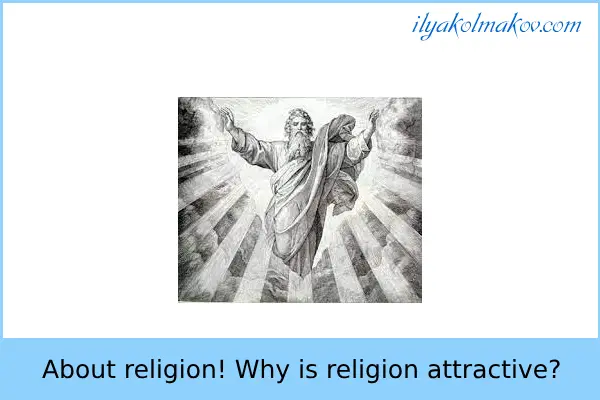
I would like to talk about religion. Of course, I'm not interested in religion as such. I wonder why the idea of a so-called god is popular.
After all, as far as I understand, the idea of the existence of God is the essence of religion. And of course, this entails a claim on the part of this very god, for authoritarianism. The idea of having some kind of authority, and even of such a metaphysical scale, turns out to be very tempting for a person who does not burden himself with the search for his own meanings: there is a ready explanation for everything that happens in the form of a certain “creator” who knows everything and manages everything.
I think that it would be naive to believe that religion is some kind of current separate from the state regime. If it happens separately, then it is the state system. Someone says that there is supposedly a religion as something good and there is a religion that is used as an idea for selfish purposes. BUT, if you think about it, maybe the idea is not selfish. After all, there are no objective signs of the existence of the so-called God. What grounds should there be for treating this idea as something, even if it claims to be objective?
The idea of religion involves the key idea that there is someone who determines what is good and what is bad. The person himself is assigned the role of a passive being, who must put up with the circumstances that are sent down to him. From the point of view of the religious worldview, a person should not attempt his own comprehension of being, because the true motives of "God" may be revealed.
Why is religion attractive?
Why is religion attractive to many people? The presence of religious institutions and various rituals in the form of a certain system creates in a person the illusion of the meaningfulness of religion as such. It begins to seem to him that the ideological component of religion reflects the objective state of things, although this is nothing more than a religious entourage, no matter how serious it may seem.
The fact is that the religious idea has nothing to do with reality. It exists only due to its claim to authorship in relation to the world, but at the same time, it cannot give a reasonable explanation for any phenomenon. When trying to give its own explanation of objective processes, religion comes into severe conflict with reality. Here I spoke on the topic - the religious ideaOpens in a new window.
The only thesis is that there is a certain god who created everything, but only religious institutions, wooden boards with strange painted faces and the remains of corpses, which are called relics, are considered sacred. For some reason, religion cannot exist without its penchant for necrophilia. Life itself is not important - it is important what will happen after this life, therefore everything dead is more sacred than the living. This is one of the main theses of religion.
A religious person is a person who glorifies everything that is connected with death, but not with life. For everything that concerns life, religion can only give superficial answers, again, attributing authorship in the creation of the world to some god. God, for some reason, sat idle until a certain point in time and suddenly decided to create everything.
The explanation of any phenomenon occurring in the world is explained by the only argument in favor of the authorship of God. God created people who kill each other by the millions in wars. But God, apparently, stubbornly does not want to interfere in these processes. He doesn't care about his creation. Instead, the priests continue to bless the soldiers to kill. It turns out such a schizophrenic picture. The state god is the god of all that is dead.
Religion saves a person from moral decisions.
A person does not really need to think about the moral meaning of his decisions, because his actions, for himself, are already morally predetermined from the position of his religion, that is, he considered them correct from the point of view of the religious code.
Religion relieves him of any moral burden in evaluating his actions. After all, for him it is not his actions themselves that become the subject of a moral guide, but the ease of their commission, because he himself is not burdened with moral decisions, which, in the healthy course of things, precede actions.
But he loves himself, although he does not decide for himself whether he does well or badly. This is love for oneself, as for an unreasonable child, for whom it is absolutely natural to follow parental instructions. The only difference is that the consequences of a religious child's actions can be far more severe than those of a real child.